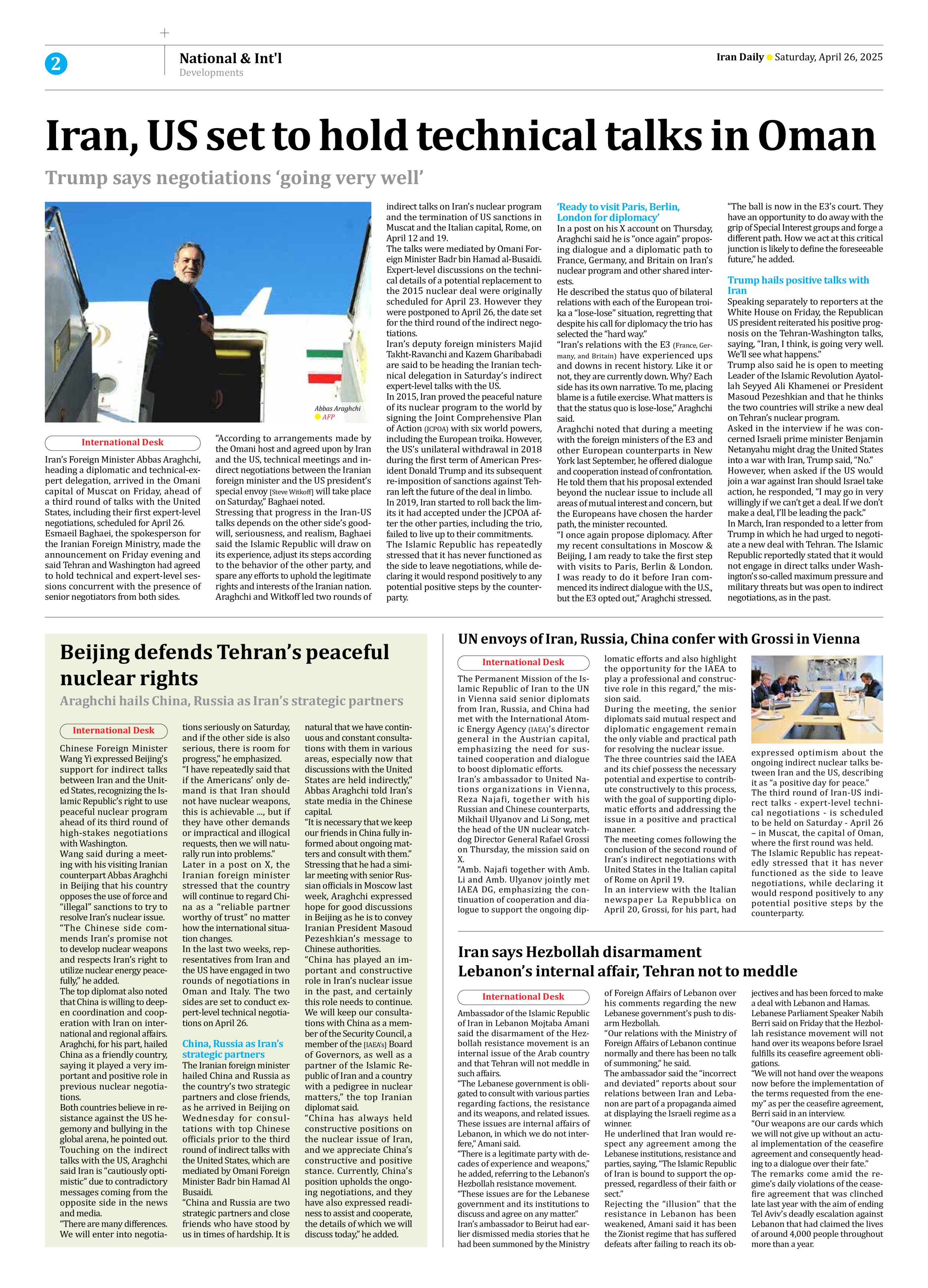
Iran, US set to hold technical talks in Oman
Trump says negotiations ‘going very well’
Iran’s Foreign Minister Abbas Araghchi, heading a diplomatic and technical-expert delegation, arrived in the Omani capital of Muscat on Friday, ahead of a third round of talks with the United States, including their first expert-level negotiations, scheduled for April 26.
Esmaeil Baghaei, the spokesperson for the Iranian Foreign Ministry, made the announcement on Friday evening and said Tehran and Washington had agreed to hold technical and expert-level sessions concurrent with the presence of senior negotiators from both sides.
“According to arrangements made by the Omani host and agreed upon by Iran and the US, technical meetings and indirect negotiations between the Iranian foreign minister and the US president’s special envoy [Steve Witkoff] will take place on Saturday,” Baghaei noted.
Stressing that progress in the Iran-US talks depends on the other side’s goodwill, seriousness, and realism, Baghaei said the Islamic Republic will draw on its experience, adjust its steps according to the behavior of the other party, and spare any efforts to uphold the legitimate rights and interests of the Iranian nation.
Araghchi and Witkoff led two rounds of indirect talks on Iran’s nuclear program and the termination of US sanctions in Muscat and the Italian capital, Rome, on April 12 and 19.
The talks were mediated by Omani Foreign Minister Badr bin Hamad al-Busaidi.
Expert-level discussions on the technical details of a potential replacement to the 2015 nuclear deal were originally scheduled for April 23. However they were postponed to April 26, the date set for the third round of the indirect negotiations.
Iran’s deputy foreign ministers Majid Takht-Ravanchi and Kazem Gharibabadi are said to be heading the Iranian technical delegation in Saturday’s indirect expert-level talks with the US.
In 2015, Iran proved the peaceful nature of its nuclear program to the world by signing the Joint Comprehensive Plan of Action (JCPOA) with six world powers, including the European troika. However, the US’s unilateral withdrawal in 2018 during the first term of American President Donald Trump and its subsequent re-imposition of sanctions against Tehran left the future of the deal in limbo.
In 2019, Iran started to roll back the limits it had accepted under the JCPOA after the other parties, including the trio, failed to live up to their commitments.
The Islamic Republic has repeatedly stressed that it has never functioned as the side to leave negotiations, while declaring it would respond positively to any potential positive steps by the counterparty.
‘Ready to visit Paris, Berlin, London for diplomacy’
In a post on his X account on Thursday, Araghchi said he is “once again” proposing dialogue and a diplomatic path to France, Germany, and Britain on Iran’s nuclear program and other shared interests.
He described the status quo of bilateral relations with each of the European troika a “lose-lose” situation, regretting that despite his call for diplomacy the trio has selected the “hard way.”
“Iran’s relations with the E3 (France, Germany, and Britain) have experienced ups and downs in recent history. Like it or not, they are currently down. Why? Each side has its own narrative. To me, placing blame is a futile exercise. What matters is that the status quo is lose-lose,” Araghchi said.
Araghchi noted that during a meeting with the foreign ministers of the E3 and other European counterparts in New York last September, he offered dialogue and cooperation instead of confrontation.
He told them that his proposal extended beyond the nuclear issue to include all areas of mutual interest and concern, but the Europeans have chosen the harder path, the minister recounted.
“I once again propose diplomacy. After my recent consultations in Moscow & Beijing, I am ready to take the first step with visits to Paris, Berlin & London. I was ready to do it before Iran commenced its indirect dialogue with the U.S., but the E3 opted out,” Araghchi stressed.
“The ball is now in the E3’s court. They have an opportunity to do away with the grip of Special Interest groups and forge a different path. How we act at this critical junction is likely to define the foreseeable future,” he added.
Trump hails positive talks with Iran
Speaking separately to reporters at the White House on Friday, the Republican US president reiterated his positive prognosis on the Tehran-Washington talks, saying, “Iran, I think, is going very well. We’ll see what happens.”
Trump also said he is open to meeting Leader of the Islamic Revolution Ayatollah Seyyed Ali Khamenei or President Masoud Pezeshkian and that he thinks the two countries will strike a new deal on Tehran’s nuclear program.
Asked in the interview if he was concerned Israeli prime minister Benjamin Netanyahu might drag the United States into a war with Iran, Trump said, “No.”
However, when asked if the US would join a war against Iran should Israel take action, he responded, “I may go in very willingly if we can’t get a deal. If we don’t make a deal, I’ll be leading the pack.”
In March, Iran responded to a letter from Trump in which he had urged to negotiate a new deal with Tehran. The Islamic Republic reportedly stated that it would not engage in direct talks under Washington’s so-called maximum pressure and military threats but was open to indirect negotiations, as in the past.







